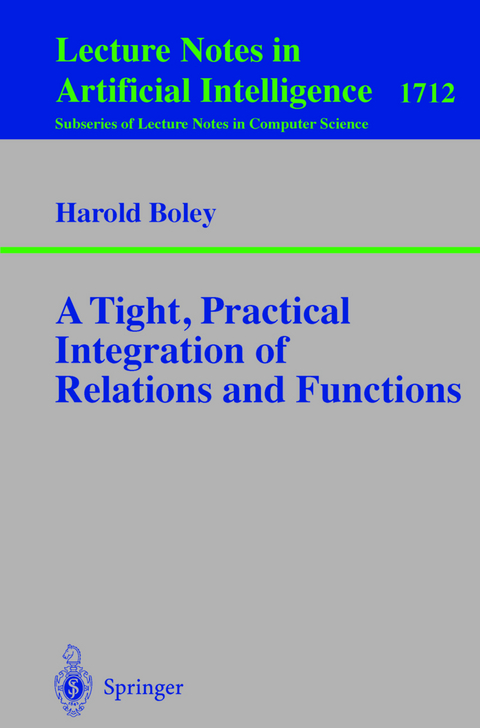
A Tight, Practical Integration of Relations and Functions
Seiten
1999
|
1999
Springer Berlin (Verlag)
978-3-540-66644-8 (ISBN)
Springer Berlin (Verlag)
978-3-540-66644-8 (ISBN)
As in other fields, in computer science certain objects of study can be synthesized from different basic elements, in different ways, and with different resulting stabilities. In subfields such as artificial intelligence, computational logic, and programming languages various relational and functional ingredients and techniques have been tried for the synthesis of declarative programs.
This text considers the notions of relations, as found in logic programming or in relational databases, and of functions, as found in functional programming or in equational languages. We study a declarative integration which is tight, because it takes place right at the level of these notions, and which is still practical, because it preserves the advantages of the widely used relational and functional languages PROLOG and LISP. The resulting relational and functional language, RELFUN, is used here for exemplifying all integration principles.
This text considers the notions of relations, as found in logic programming or in relational databases, and of functions, as found in functional programming or in equational languages. We study a declarative integration which is tight, because it takes place right at the level of these notions, and which is still practical, because it preserves the advantages of the widely used relational and functional languages PROLOG and LISP. The resulting relational and functional language, RELFUN, is used here for exemplifying all integration principles.
An overview of the relational-functional language RELFUN.- Extended logic-plus-functional programming.- A direct semantic characterization of RELFUN.- Finite domains and exclusions as first-class citizens.- Multiple-valued Horn clauses and their WAM compilation.
| Erscheint lt. Verlag | 29.9.1999 |
|---|---|
| Reihe/Serie | Lecture Notes in Artificial Intelligence | Lecture Notes in Computer Science |
| Zusatzinfo | XII, 176 p. |
| Verlagsort | Berlin |
| Sprache | englisch |
| Maße | 155 x 233 mm |
| Gewicht | 248 g |
| Themenwelt | Informatik ► Theorie / Studium ► Compilerbau |
| Informatik ► Theorie / Studium ► Künstliche Intelligenz / Robotik | |
| Schlagworte | Artificial Intelligence • Computational Logic • Functional Programming • Functions • Horn-Clauses • Intelligence • Künstliche Intelligenz • LISP • Logic • Logic Programming • Mathematische Logik • programming • Programming language • Programming Languages • Relational-Functional Programming • Relations • RELFUN |
| ISBN-10 | 3-540-66644-3 / 3540666443 |
| ISBN-13 | 978-3-540-66644-8 / 9783540666448 |
| Zustand | Neuware |
| Haben Sie eine Frage zum Produkt? |
Mehr entdecken
aus dem Bereich
aus dem Bereich
a beginner's guide to learning llvm compiler tools and core …
Buch | Softcover (2024)
Packt Publishing Limited (Verlag)
CHF 69,80


